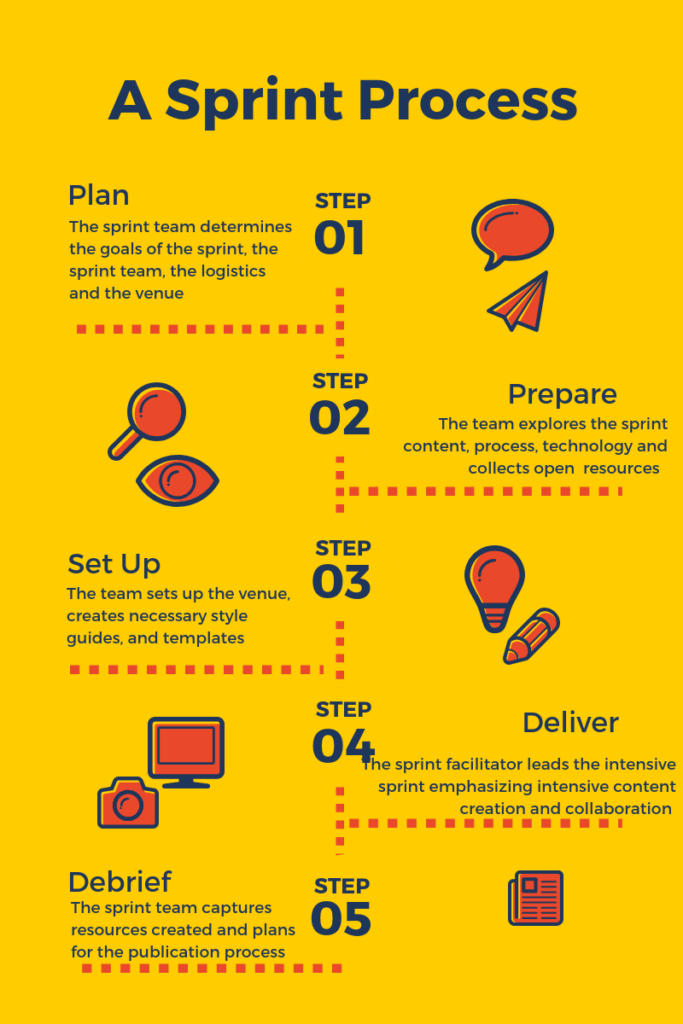Building Open Education Initiatives
Strategies & Steps for Growing OER Initiatives
This section provides some resources to support and grow open initiatives at your institution. The intention is to provide a variety of resources and tools to fit each institution based on where they are in their open education journey.
 Individual Level
Individual Level
If you are interested in becoming an OER champion at your institution, your first step could be to engage in open communities and learn from others. We have gathered a small sampling of networks and newsletters that you can review and join below.
Ontario
- eCampus Ontario Open Communities (available to Ontario educators)
- eCampus Ontario Open Library Network (OOLN)(OOLN is a community initiative powered by eCampusOntario to steward the growth of Open Education at Ontario Colleges and Universities.)
Canada
- BC Open Education Librarians OEL
- Réseau-REL (French-language listserv)
Global
- Community College Consortium for OER CCCOER Google Group
- Creative Commons Open Education Platform CCOpenEdu
- Global OER Graduate Network (GO-GN.net) Group
- OER Commons
- Open Education Community
- Open Education Group
- Open Education Network Community
- SPARC – OE Forum (the Scholarly Publishing and Academic Resources Coalition)
Job Postings
It can be challenging justifying the need for open education support roles when competing with other funding priorities. A temporary position frees up time for overworked library faculty and staff who may have championed OER off the side of their desk. Administrators may be convinced to convert a temporary position into a permanent one when they see a demonstrated impact. Consider this post on Advice on one-year OER Librarian Positions for guidance on temporary positions. The post also includes a list of ideas of action items to try when adopting an OER support role.
 Institutional Group Level
Institutional Group Level
If your institution is interested in supporting a community of practice or working group, the following resources may be helpful.
Open working groups are a great way to build advocacy, momentum, and gather like-minded individuals interested or already engaged in open educational practices (OEP). These groups often create timebound tasks, and sometimes champion projects like developing an Open Educational Resource (OER) strategy. Other groups may include cross-departmental members in charge of distributing OER grants.
Included below are some information to help you establish a new group, or to renew/revitalize, or formalize an existing one. Also included are some examples of working groups and research about communities of practice.
- Working Group Guide — Establishing a Working Group
- Ontario Open Library Network OER Working Group Templates
- Western University’s Open Education Working Group Charter
- The Rebus Guide to Publishing Open Textbooks (So Far) provides a whole section on building a team and project scoping to assist you in your open project.
Sprints
 A Sprint Process by Krista Lambert and Lucas Wright BCcampus. Licensed under CC-BY 4.0. Click on the image to enlarge.
A Sprint Process by Krista Lambert and Lucas Wright BCcampus. Licensed under CC-BY 4.0. Click on the image to enlarge.
Long Image Description
A Sprint Process
Step 01: Plan
The sprint team determines the goals of the sprint, the sprint team, the logistics, and the venue
Step 02: Prepare
The team explores the sprint content, process, technology and collects open resources
Step 03: Step Up
The team sets up the venue, creates necessary style guides, and template
Step 04: Deliver
The sprint facilitator leads the intensive sprint emphasizing intensive content creation and collaboration
Step 05: Debrief
The sprint team captures resources created and plans for the publication process
The concept of a sprint comes from software design and is increasingly used as a strategy or approach for developing OER. The sprint approach can be used in a variety of contexts where a group of people (often cross-disciplinary) come together to focus on a specific project. In higher education, sprints are emerging as a way to accomplish a shared goal while working across disciplines and on a short timeline. Hackathons or Jams can follow a similar process — but often have a competitive element.
The sprint methodology involves the following features:
- short timelines and achievable goals;
- time-boxed working sessions (usually two to three days, but can vary according to context and needs);
- a defined outcome (to produce a textbook or other resource, etc.);
- a planning process to develop the sprint process;
- multiple perspectives and skill sets;
- identified/agreed roles for participants;
- collaborative — rather than competitive — development processes
Sprint Resources
Explore more information and examples of sprints by clicking on the following links:

